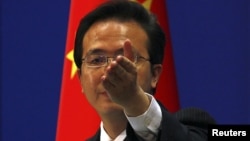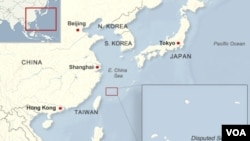BEIJING —
China's foreign ministry is pushing back on statements from U.S. Secretary of State Hillary Clinton about a chain of islands claimed by both Japan and China. The Secretary's comments provoked a critical response from officials and state-backed media.
Friday, Clinton met with the Japanese foreign minister and said the United States does not have a position on who has sovereignty over the disputed islands in the East China Sea. But she said Washington opposes actions that would undermine Japan's longstanding administration of the islands.
Foreign ministry spokesman Hong Lei told reporters in Beijing that Clinton's comments confused right and wrong.
Rising tensions
He said China urges the U.S. to take a responsible attitude towards dealing with the Diaoyu Islands, be cautious in what they say and do, and take concrete steps to maintain regional stability and Sino-U.S. ties to gain the trust of the Chinese people.
Tensions over the islands, known as the Senkaku in Japan and Diaoyu in China, have risen in the past year, alongside other similar regional territorial disputes in the South China Sea. Chinese and Japanese ships have had numerous stand-offs and run-ins in the international waters around the remote islands. Last week Japanese fighter jets scrambled after a Chinese state-owned plane flew close to the islands’ airspace.
Clinton said Washington wants to maintain the status-quo until there is a more constructive dialogue.
Beijing backlash
State-backed newspapers in recent days in China have carried critical commentaries, slamming the United States for weighing-in on the dispute with Japan.
Shi Yinhong, Professor or International Relations at Renmin University, said China’s reaction to Clinton’s remarks is no surprise given Beijing's statements avowing its historical sovereignty over the islands.
"The Chinese reaction represents the severe disagreement and resentment against U.S. attitude toward Sino-Japanese confrontation which in China's eyes is biased against China and in favor of Japan," said Shi.
Last year, when a wealthy Japanese family sold the privately-held islands to the government, the sale triggered widespread protests in China. China says it will carry out a geographical survey of the East China Sea, mapping it’s territorial islands and reefs. It has not yet clarified, though, when this survey will take place.
Friday, Clinton met with the Japanese foreign minister and said the United States does not have a position on who has sovereignty over the disputed islands in the East China Sea. But she said Washington opposes actions that would undermine Japan's longstanding administration of the islands.
Foreign ministry spokesman Hong Lei told reporters in Beijing that Clinton's comments confused right and wrong.
Rising tensions
He said China urges the U.S. to take a responsible attitude towards dealing with the Diaoyu Islands, be cautious in what they say and do, and take concrete steps to maintain regional stability and Sino-U.S. ties to gain the trust of the Chinese people.
Tensions over the islands, known as the Senkaku in Japan and Diaoyu in China, have risen in the past year, alongside other similar regional territorial disputes in the South China Sea. Chinese and Japanese ships have had numerous stand-offs and run-ins in the international waters around the remote islands. Last week Japanese fighter jets scrambled after a Chinese state-owned plane flew close to the islands’ airspace.
Clinton said Washington wants to maintain the status-quo until there is a more constructive dialogue.
Beijing backlash
State-backed newspapers in recent days in China have carried critical commentaries, slamming the United States for weighing-in on the dispute with Japan.
Shi Yinhong, Professor or International Relations at Renmin University, said China’s reaction to Clinton’s remarks is no surprise given Beijing's statements avowing its historical sovereignty over the islands.
"The Chinese reaction represents the severe disagreement and resentment against U.S. attitude toward Sino-Japanese confrontation which in China's eyes is biased against China and in favor of Japan," said Shi.
Last year, when a wealthy Japanese family sold the privately-held islands to the government, the sale triggered widespread protests in China. China says it will carry out a geographical survey of the East China Sea, mapping it’s territorial islands and reefs. It has not yet clarified, though, when this survey will take place.





